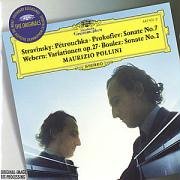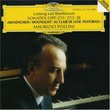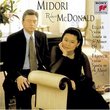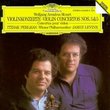| All Artists: Stravinsky, Prokofiev, Webern, Maurizio Pollini Title: Stravinsky, Prokofiev, Webern, etc / Maurizio Pollini Members Wishing: 2 Total Copies: 0 Label: Deutsche Grammophon Release Date: 2/13/1996 Genre: Classical Styles: Forms & Genres, Sonatas, Suites, Historical Periods, Modern, 20th, & 21st Century Number of Discs: 1 SwapaCD Credits: 1 UPC: 028944743128 |
Search - Stravinsky, Prokofiev, Webern :: Stravinsky, Prokofiev, Webern, etc / Maurizio Pollini
 | Stravinsky, Prokofiev, Webern Stravinsky, Prokofiev, Webern, etc / Maurizio Pollini Genre: Classical
Pollini is so much a part of the contemporary music scene that it's amazing to realize that the earliest material on this disc (Stravinsky and Prokofiev) dates to the 1940s. These two performances retain their power to sta... more » |
Larger Image |
CD DetailsSynopsis
Amazon.com essential recording Pollini is so much a part of the contemporary music scene that it's amazing to realize that the earliest material on this disc (Stravinsky and Prokofiev) dates to the 1940s. These two performances retain their power to startle and amaze, both through Pollini's seemingly effortless virtuosity and through the immediacy of his musical conceptions. This Prokofiev is a close rival even to Richter's. Webern, from six years later, is so colorful and well organized that it makes the difficult music almost easy to listen to. Not many listeners will put up with Boulez's obscurities, but there is still plenty to make the disc worthwhile. --Leslie Gerber Similarly Requested CDs
|
CD ReviewsHighly praised - highly impressive Patrik Lemberg | Tammisaari Finland | 04/12/2004 (5 out of 5 stars) "Pollini's performance of these three movements from Stravinsky's Petrouchka and Prokofiev's Piano Sonata no.7 were recorded in 1971, and his performance of Webern's Piano Variations and Boulez's Piano Sonata were recorded in 1976. These recordings were originally released by Deutsche Grammophon on two separate LP records; the first in 1972 (Stravinsky/Prokofiev,) and the second in 1978 (Webern/Pollini.) They have now been refurbished and combined on this 68+ minute disc. One does not have to be familiar with the sound of the original recordings to appreciate Deutsche Grammophon's restoration job; the sound is clear and should be satisfactory to any listener. I love Stravinsky's own reading of Petrouchka (CSO, 1960) - it was my first introduction to his music, and it is still the recording of the ballet which, for me, is closest to heart, but Pollini's performance on this disc is indeed in an impressive class of its own, and I therefore suggest for people who like Petrouchka to listen to this performance of it, as it will allow new comprehensions of melodic lines that earlier might not have appeared as tangible. Pollini performs approximately half of the original piece (15 minutes,) and I believe that no more than this has been transcribed for solo piano. The main reason for my having listened to this disc at least 20 times during the last few weeks is the Prokofiev tracks; both music and performance are beyond my vocabulary, but I suppose are describable as stunning and skillful. This has been my first introduction to both Prokofiev's and Boulez's music, and I must say that of the two I favor the music of Prokofiev - it is more easily digested in comparison to Webern's and Boulez's music, although all the performances here are impressive; they will not allow you to listen with anything but a keen ear. This has to be one of the most tasteful and thrilling solo piano albums of modern classical music. 10/10." One of the top piano discs of my collection John Grabowski | USA | 07/22/2005 (5 out of 5 stars) "This is one amazing disc of piano-playing, one that never ceases to leave my mouth hanging open every time I listen to it. Do yourself a favor if you read music and find a score of the Stravinsky. Follow along as Pollini plays and be amazed, truly amazed. Amazed not just at the virtuosity, but at how *easy* and effortless he makes it sound. In his hands, it's hard to believe this is *difficult* music, yet the score tells otherwise. This work is so formidable that only a few other pianists have dared tackle it--Gilels, and Horowitz in the first movement only. (A pity, since I would have loved to hear him play the whole thing.) Pollini leaves them all in the dust, with clarity and a directness that's perfect for the work. (Many people say Pollini is a cold and distant interpretor, and I tend to agree, but this apporach served Stravinsky--a man who kept his emotional states out of his music--well. But Petrushka is just the beginning. The Prokofiev is a stunner. (And listen to how different his color palette is from that of Petrushka!) If it doesn't have quite as much character as Richter, well, that's still a pretty high standard. Once again Pollini rips through it as though it were child's play. I'd maybe prefer a little more of the composer's trademark sardonicism. But the complaint is slight. Kudos also just for the programming on this disc. The Sonata follows Stravinsky perfectly, yet it's of a completely different character. I wonder if Pollini programmed them together in live recitals. The Webern is an ideal piece for people who say they don't like atonal music. It's a great introduction--short, succinct and relatively easy to follow. Pollini actually finds what to me sounds like lyricism in a place you wouldn't necessarily expect lyricism. The performance builds with great, though subtle, tension, and again Pollini's clarity is ideal for delineating the piece. This is a great way to be introduced to The Second Viennese School, and to Webern. Finally comes one of the most famous, or infamous, of 20th century piano works, Boulez's Second Sonata. I can't speak knowledgeably about this piece, as I'm still discovering it. But Idil Biret's recording strikes me as "warmer," if you can call something atonal by Boulez warm. And the recent Paavali Jumppanen recording seems to connect the dots better. But such observations should be taken as a grain of salt, for I am, as I said, still learning this strange and extremely complex work. It's interesting how the works become more abstract and dissonant as the disc goes on. This is not just a terrifically-played piano recording; it's also a study of the decay of Western tonality and the rise of a new music system. It's also one of the most thrilling and unique piano records in DG's entire catalog. Snap it up!" One of the all-time great piano recordings Bruce Hodges | New York, NY | 11/08/2002 (5 out of 5 stars) "I think it is fair to say that this recording is a classic by any standard. It shows one of the world's greatest - some say *the* greatest - living pianists at the peak of his powers, in repertoire that only the most assured musicians would even dream of playing. Pollini here tackles four formidable examples of 20th-century music, including what is arguably the disc's showpiece, Stravinsky's "Three Movements from Petrouchka." This CD is worth acquiring for this alone. If you enjoy the orchestral version, hearing it for "just piano" may not initially seem as satisfying, but Pollini's cool brilliance will quickly change your mind. The Prokofiev Seventh Sonata is also a slightly terrifying piece (at least, to those of us who are non-pianists), but again, Pollini races through its difficulties with an almost scary nonchalance. To some pianists I know, this is the finest version of this sonata ever recorded. The two remaining pieces will be the most daunting for some listeners, but Pollini is as good a salesman as you'll ever hear. The dense, complex Boulez - what an amazing piece! - may seem formidable at first, but becomes clearer with each hearing. If nothing else, it's just so astonishingly difficult that you can't help but be impressed, that any human being could learn to play it at all. And the elegant Webern "Variations," in Pollini's hands, is as glistening as a waterfall. Highly recommended for devotees of some of the 20th century's most arresting music for the piano, or fans of outstanding piano playing in general. The sound, on DG's "Originals" series, is much closer to the original LP this time around."
|

 Track Listings (13) - Disc #1
Track Listings (13) - Disc #1

![Brahms: Ein deutsches Requiem [A German Requiem]](https://nationalbookswap.com/cd//m/23/8723/6058723.jpg)






